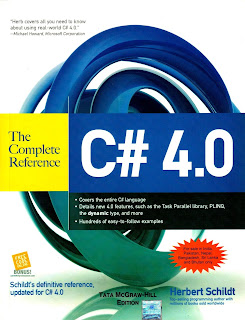The Definitive Guide to C# “From using LINQ to covariance and from
string formatting to optional arguments, Herb’s update covers all you
need to know about using real-world C# 4.0.” ?Michael Howard, Microsoft
Corporation
Bestselling author Herb Schildt has updated and expanded his classic
programming reference to cover C# 4.0--the latest release of this
powerful, feature-rich language. Using carefully crafted explanations,
insider tips, and hundreds of examples, C# 4.0: The Complete Reference
offers in-depth details on all aspects of C#, including keywords,
syntax, and core libraries. New C# 4.0 features, such as named and
optional arguments, the dynamic type, expanded covariance and
contravariance capabilities, and support for parallel programming with
the Task Parallel Library (TPL) and PLINQ are also discussed.
Perfect for beginners and professional C# programmers alike, this
expert resource is written in the clear, crisp, uncompromising style
that has made Herb the choice of millions worldwide. Begin mastering C#
4.0 today with help from this authoritative volume!
Coverage includes:
-
Data types and operators
-
Control statements
-
Classes and objects
-
Constructors, destructors, and methods
-
Interfaces, arrays, enumerations, and structures
-
Method and operator overloading
-
Inheritance and virtual methods
-
Reflection and runtime type ID
-
Exception handling
-
Delegates, properties, events, and indexers
-
Attributes
-
Multithreading and the Task Parallel Library
-
Generics
-
LINQ and PLINQ
-
Lambda expressions
-
Anonymous types
-
Extension methods
-
Named and optional arguments
-
Implicitly typed variables
-
I/O, networking, and collections
-
The preprocessor and much, much more





